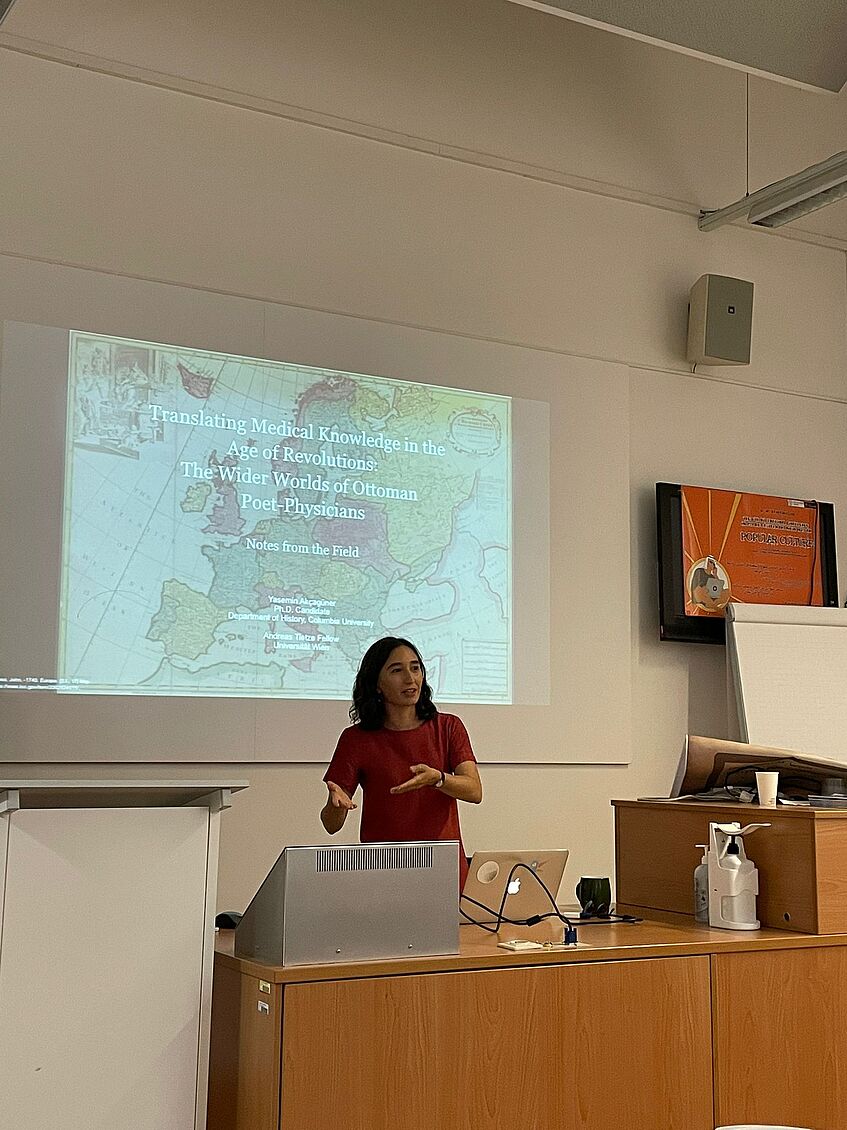Interview with Yasemin Akçagüner (MA) (Andreas Tietze Fellow 2022)

Interview with Yasemin Akçagüner (MA) (Andreas Tietze Fellow 2022)
Yasemin Akçagüner spent one month in Vienna as Andreas Tietze Fellow for her Project “Celestial Bodies: Astral Science, Medicine and the Ottoman Lifecycle (1768-1839)”
Would you briefly introduce yourself?
Originally from Istanbul, I am a fourth-year Ph.D. candidate in the History Department at Columbia University in New York.
What are you currently working on?
Currently, I am conducting archival research for my dissertation, which investigates the transformation of medical and astral scientific knowledge concerning the human body at the turn of the nineteenth century in the Ottoman Empire. I am trying to read this transformation through the life and work of an Ottoman physician-turned-court chronicler: Şanizade Ataullah Efendi.
Can you tell us a bit about your research stay in Vienna?
During my four-week-stay in Vienna, I was able to access and reproduce a number of rare Ottoman medical manuscripts held at the Austrian National Library. These texts included, among others, translated treatises on smallpox vaccination, materia medica, and a collection of poems (divan) by Şanizade Ataullah Efendi - physician and court historian. In order to understand the medical knowledge network within which Ottoman physicians were embedded, I also took a short trip to Padova and examined student records at the Archivio storico dell’Università di Padova. I identified a number of Ottoman Greek physicians who studied at Padova at the turn of the century and found the student records of one physician Şanizade praises in his Tarih!
At the end of my stay in Vienna, I also had the opportunity to present my preliminary research findings at the OrGes organized lecture titled “Translating Medical Knowledge in the Age of Revolutions: The Wider Worlds of Ottoman Poet-Physicians.” The onus of the lecture pushed me to think extensively on the circulation of medical texts between Istanbul, Vienna and Venice and the connected history of knowledge that emerges from that circulation at the turn of the nineteenth century - a new direction for my work.
Do you want to publish your research or present it to the academic community? How will it go further?
This research will form significant parts of two chapters of my dissertation and I hope to present a draft of the chapter where I deal with the poetry of Ottoman physicians at a workshop next spring in Vienna. The Department of Near Eastern Studies at the University of Vienna is very strong in its philological training and as a history student without this kind of formation, I was very lucky to learn from Professor Gisela Procházka-Eisl and Ercan Akyol on how to approach my sources with attention to orthography, the conventions of divan poetry and chronogram poems. They spent hours pouring over manuscripts with me, and I hope that I can put to use what I have learned from them in the short time we spent together and present a chapter for the comments of the department community in the near future.
Do you have anything else to add?
The month I spent in Vienna has been my most productive and fruitful period of research since the beginning of the pandemic and for that I am deeply grateful to the department community, especially Professor Yavuz Köse, Dr. Onur İnal, Ayşe Dilsiz-Hartmuth, Ercan Akyol, Aysu Akcan and Professor Gisela Procházka-Eisl for embracing me with open arms and smoothing my access to the spaces of research and learning in Vienna and beyond. I thank Professor Yavuz Köse for connecting me with scholars at Padova, a bridge without which my archival research at the Archivio Storico would simply be impossible.
Last but not least, I am grateful to the Andreas Tietze Fellowship for making my research stay in Vienna possible. I hope to see everyone again very soon!
